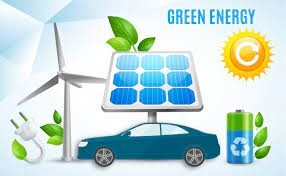The Future With Electric Cars And Renewable Energy
Akshay Ashok Singh
In recent years, the automotive industry has witnessed a transformative shift towards sustainability, with electric cars at the forefront of this revolution. As concerns over climate change and environmental degradation continue to escalate, the integration of electric vehicles (EVs) into our daily lives represents a crucial step towards a cleaner, greener future.
The future is knocking at the door with many challenges that will be faced by the next generation. With the increasing pollution, it is our responsibility to secure the future of our next generation. This can only be achieved by adopting the use of electronic vehicles and renewable energy sources.
Compared to traditional vehicles, which work by burning gasoline or diesel fuel, EVs are powered by electricity stored in a rechargeable battery. They also are very energy efficient and can travel four times as far as a traditional car given the same amount of energy.
A large chunk of the greenhouse gases that blanket the Earth and trap the sun’s heat are generated through energy production, by burning fossil fuels to generate electricity and heat. To overcome this problem renewable energy sources are an alternative. Renewable energy sources – which are available in abundance all around us, provided by the sun, wind, water, waste and heat from the Earth – are replenished by nature and emit little to no green house gases or pollutants in the air. Renewable energy sources are available in all countries and their potential is yet to be fully harnessed. Cheap electricity from renewable sources could provide 65 percent of the world’s total electricity supply by 2030. It could decarbonize 90 percent of the power sector by 2050, massively cutting carbon emissions and helping to mitigate climate change.
The economic landscape is also evolving in tandem with the rise of electric cars and renewable energy. The renewable energy sector is creating new job opportunities, driving innovation and contributing to economic growth. The transition towards electric mobility is fostering a shift in the job market, with increased demand for skilled workers in areas such as battery technology, electric vehicle manufacturing and renewable energy infrastructure development.
Moreover, governments worldwide are implementing policies and incentives to accelerate the adoption of electric cars and renewable energy. Subsidies, tax creditsand regulatory measures are encouraging consumers to make the switch to electric vehicles, thereby fostering a sustainable transportation culture. As these policies continue to evolve, the cost of electric cars is expected to decrease, making them more accessible to a broader demographic.
The future with electric cars and renewable energy is not only about reducing carbon emissions but also redefining the way we perceive and interact with transportation. Electric cars are not just a mode of transportation; they represent a catalyst for a broader societal shift towards sustainability. Embracing this future means embracing a cleaner, healthier planet for generations to come.
The future with electric cars and renewable energy holds great promise for a more sustainable and eco-friendly world. As technology continues to advance, the synergy between electric vehicles and clean energy sources will play a pivotal role in shaping our transportation landscape. With collaborative efforts from governments, industries and individuals, we can drive towards a future where electric cars are the norm and renewable energy powers our journey towards a greener tomorrow.
